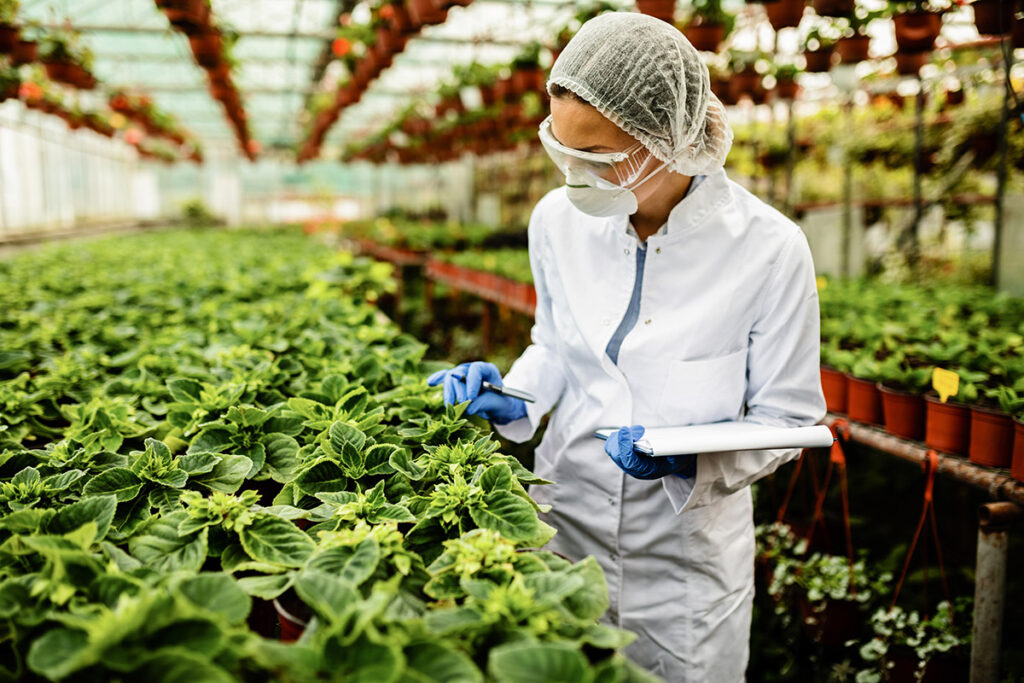Agricultural biotechnology uses modern technology to develop new farming processes that increase crop strength, productivity, and sustainability. CRISPR technology plays a significant role in breeding crops with higher drought and disease resistance, reducing the effects of climate change. Additionally, artificial intelligence solutions boost resource utilization, lower environmental impact, and improve agricultural yields.
Key Trends Driving Investment in Biotechnology in Agriculture
Agricultural biotechnology is seeing sizable investment, particularly in genetic editing and precision agriculture fields, and is leading to changes in traditional farming practices that increase yields and produce heartier crops. Advances in genetic editing, like CRISPR-Cas9 technology, enable the development of disease resistance, drought tolerance, and improved nutritional features. Remarkable successes in genetic editing include the creation of non-browning mushrooms and disease-resistant types of wheat and rice. In addition, precision agriculture systems, including GPS-guided machinery and sensor-equipped drones, allow farmers to gain efficiency, maintain crop health, and set planting strategies.
Biopesticides and Sustainable Farming Practices
Biopesticides are developed from plants, fungi, and bacteria, and offer several benefits over chemical pesticides, including
- lower toxicity,
- reduced environmental impact,
- low residue buildup, and
- and specific pest targeting.
Focusing on safe and sustainable pest management helps with agricultural investor interest and market growth.
Data Analytics and AI in Farming
Targeted data analysis and AI algorithms help farmers improve their crop planning and pest control efforts, leading to more accurate harvest estimates. Farmers gain real-time insights into soil conditions, weather forecasts, crop development, and pest behavior using sensors and drones that deliver “big-data” analytics. Real-time data helps AI algorithms identify patterns and predict problems, enabling far more efficient operations, less environmental impact, and higher rates of production.
Investment Opportunities in Agricultural Biotechnology
Startups and other groups looking for innovative solutions can find investment opportunities. Examples include
- Indigo Agriculture, a company committed to working with plant microbiomes to enhance crops. In 2023, they successfully raised $360 million in Series F funding.
- Benson Hill, a company known for its biology-driven work in crop genetics. In 2022, they successfully raised $150 million in Series D funding.
Public and Private Funding
Government programs like specific research grants and startup subsidies are notable in biotechnology research and development. At the same time, venture capital firms and private equity investors bring needed funding to the agricultural biotech industry that increases innovation and assists commercialization. Strategic relationships between agricultural corporations and agritech startups help exchange critical knowledge, provide market access, and allow for sharing necessary resources that speed up product development and market expansion.
Risks and Challenges for Investors in Agricultural Biotech

The regulatory processes governing agricultural biotechnology are complex and differ depending on the country, involving assorted approval procedures, labeling rules, and public attitudes. Ethical concerns involving genetic modification also complicate investment reviews, with attention given to concerns like environmental impacts, possible health hazards, and socio-economic effects.
Market Volatility and Technological Uncertainties
Features like regulatory changes, geopolitical developments, and shifts in consumer interest often influence market conditions. Investors face challenges using precise market analysis, diversifying their portfolios, adapting to developing market conditions, and altering technological progress.
Competition and Intellectual Property Issues
The agricultural biotechnology industry is very competitive, and companies need to work to be the first to develop and market updated technologies. There are challenges to protecting intellectual property rights, like patents, trademarks, and trade secrets. Understanding these challenges and enforcing them is complicated, and staying ahead of the competition requires
- developing continuous investment in research and development,
- creating strategic partnerships and acquisitions,
- anticipating evolving regulatory requirements,
- and, adapting to changing consumer preferences.
The Future Outlook: Predictions and Potential Impacts
To be successful in agricultural biotechnology requires companies to constantly research and develop technological breakthroughs to meet changing market needs. Important expanding areas include agricultural technology improvement and the development of data analytics, artificial intelligence, and internet-connected devices that boost productivity. Genetic editing tools are also valuable in engineering better crops with adaptability against climate change and various pests and diseases. The consumer’s need for safer and healthier agricultural processes has led to changes from traditional chemical solutions to an increased use of biopesticides and biostimulants.
Food Security, Sustainability, and Global Agricultural Impact
Advancements in biotechnology can enhance yields, build crop strength, and improve nutritional quality. By developing sustainable farming systems and lowering the need for harsh chemicals using biopesticides and biostimulants, biotechnology helps establish more environmentally friendly agricultural practices. Because of this, biotechnological progressions play a dominant role in lowering food security concerns and reducing environmental effects associated with agriculture, like soil breakdown, water contamination, and greenhouse gas emissions.
Strategic Considerations for Biotechnology in Agriculture Investments
Before making any agricultural biotechnology investment decisions, investors need to consider the following
- scientific skills,
- market demand,
- and, regulatory systems.
Diversifying into various agricultural biotech areas, like crop genetics, precision agriculture, and biopesticides, helps investors stay current on developing trends, updated regulations, and technological developments. While agricultural biotech investments offer the possibility of returns, investors must prepare for challenges like intellectual property differences and pressure from competitors.
How Biotechnology Will Shape Future Agriculture
Agricultural biotech is essential as the world deals with problems like population growth, climate change, and migration. Modern biotechnology is vital to providing creative solutions to global issues. The agricultural sector will help farmers grow stronger crops, improve the nutritional content of food, and increase environmental sustainability using the latest advanced technologies like genetic editing, precision agriculture, and biopesticides.

